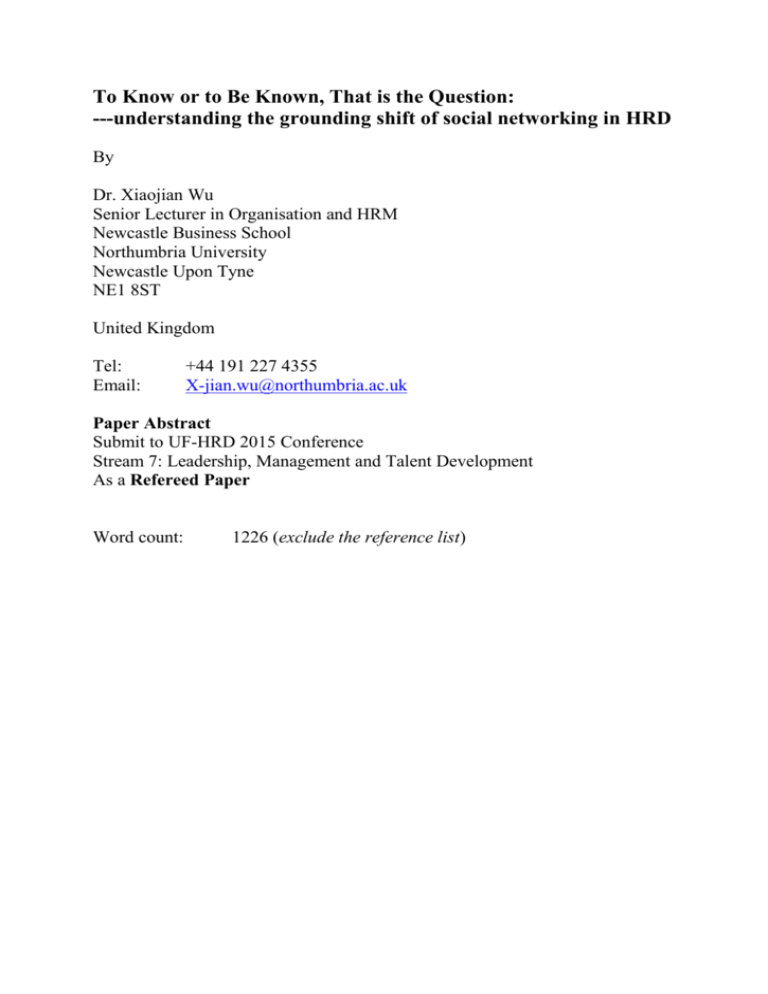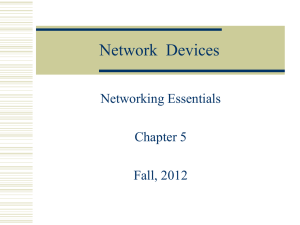To Know or to Be Known, That is the Question
advertisement

To Know or to Be Known, That is the Question: ---understanding the grounding shift of social networking in HRD By Dr. Xiaojian Wu Senior Lecturer in Organisation and HRM Newcastle Business School Northumbria University Newcastle Upon Tyne NE1 8ST United Kingdom Tel: Email: +44 191 227 4355 X-jian.wu@northumbria.ac.uk Paper Abstract Submit to UF-HRD 2015 Conference Stream 7: Leadership, Management and Talent Development As a Refereed Paper Word count: 1226 (exclude the reference list) Introduction Social networking has long being proposed in HRD literature as the right platform for managers to develop themselves through fitting into certain newly defined roles, or understanding rules of a particular line of business. However, theoretical elaborations on managers’ social networking engagements have been equivocal so far on what exactly should be the focus of social networking activities for managers against their respective personal situations. This has resulted in much of the debates on whether management individuals should treat the social network as reservoirs for fishing the needed management insights and knowledge, or to consider social networking in essence as an image management arena for professional reputation and reaching out wide. Based on an adaptation of a popular framework on circle of influences (Covey, 1989) and guided by a new epistemological paradigm proposed by Reinstam and Ashcroft (2014), we suggest that management individuals, in social networking with people from wide circles of influences, should pay more attention to the act of knowing in light of the very work practice that they are implicated, rather than any specific knowledge that could be uncovered in their situational networking engagement. This proposition represents the ground shift for management social networking as an HRD practice, and a re-conceptualisation on management knowledge against individual circumstances as well. Development for management knowledge or learning? There is currently abundant management development and organisational learning literature, contributed by HRD professionals or management practitioners alike, highlighting the process and pitfalls of developing managers to fit into specific job roles, or to understand rules in a particular line of business, especially when the managers are newly promoted or simply novel to the business and industry. (Akkerman and Bakker, 2011; Alldredge et al, 2004; Burgoyne, 1988; Han et al, 2005; Lindgren and Wahlin, 2001; Watson, 2006; Xin and Pearce, 1996 ), One of the mechanism in HRD is to facilitate managers concerned to engage actively in the social networking activities with people from the right circles at the right time point. This type of personal or professional development was based on the assumption that management knowledge to be developed can be viewed as properties possessed by particular individuals, or located within and appropriated by relevant business institutes (Blacker, 1995). Hence research on social networking activities of such business managers are mostly evolved around themes of knowledge management, organisational learning, individual agency and network theories (Adler and Kwon, 2002; Coleman, 1988; Covey, 1989; Dalton, 2010). Yet it has to be noticed that the influences of one’s contacts in social networking are by definition conditioned and restrained to particular situations only. Neither of the conventional knowledge types ( Blackler, 1995) could capture adequately the very knowledge that such new managers need most in their daily work practice, i.e. to get on with work and get things going as it should be in his or her own way. This is precisely what HRD professional and management practitioners shall focus on and facilitate those managers undertaking personal development initiatives. Social networking for knowing in practice Reinstamm and Ashcroft (2014) suggest that the very thing that those managers need and should target for in their networking activities is communicative knowledge, rather than any of the conventionally categorised types as commonly articulated. Communicative knowledge is defined as “ a distinct form of knowing, accomplished and housed in interaction, about interaction itself, and how to interact persuasively and effectively in one’s practice ( Renstamm and Ashcroft 2014:10). It is generally accepted that the day to day work of a manager calls for him or her to interact with a variety of parties to sort out disparate elements, problems and issues that can be hardly foreseeable (Watson, 2004). To communicate effectively with the parties implicated in the very work practice of the manager concerned is knowledge in itself, and the practice of knowing is the practice of management itself . This shift of cognitive attention outlines the very grounding that prospective business managers and seasoned managers alike need to attend in their daily work practice, and their social networking engagement as well. To know the right people, procedures, problems and potentials implicated in their management job, and to be known for his or her expertise, interests, ambitions and visions by the people around, should therefore always be the expectations for management individuals’ relevant networking engagement and endeavours. Nonetheless, at any single time point the management individual can only attend a particular networking dimension, and make specific effort in that regard. We borrowed the much promoted Covey's (1989) popular diagram of circle of influences in this regard but adapted it to the specific situations of social networking, with the view to highlight the locus of influences for such management individuals concerned. For managers intended to develop more influences out of the networking development practices, there are two sets of relational engagements or endeavours that they need to acknowledge and accommodate. According to the direction of projecting influences within the existing circle of social contacts, those who want to push their respective influences outwardly and targeting at reputation amongst or respect of the others networking partners, will naturally be focusing on the self at centre, and emphasize on the subjects that can be challenged or changed (figure 1). In contrast, those who want to push the influences of the other partners implicated in the network inwardly on what one could take from such engagement activities, much more attention will be placed on people around, and on those objects or tasks that can be called on for examination or to be consulted with (figure 2). Following an ethnomethodological approach in studying social networking practices, and consider knowing in practice as more important than either knowledge itself or knowledge workers, we suggest that social networking for HRD purpose should place managers knowing practice rightly in the centre, not any of the knowledge management scheme or organisational learning programme. Tsui (2012) argued in this regard that contextualisation is essential for managers’ development efforts. It calls for identifying and incorporating various elements within the very context whereby managers are implicated in applying or achieving theoretical understanding for job fulfilment. Communicative knowledge will subsequently be shore up to show its undeniable contributions to the running of all necessary business activities, which under the prevailing epistemological structure, has been downgraded as part of a personal skill so far rather than important knowledge in its own right. Conclusion In conclusion, knowing as a management practice is not just another learning activity of interest to the pedagogical research only. It is about management, and it is indeed management in practice. Communicative knowledge derived from, or resided in knowing in practices, is about what makes management possible and effective for particular individuals concerned. Business managers' social networking activities therefore should always be focusing on knowing others as an on-going practice, not to have known others as an outcome, or have been known by others either. The grounding shift of social networking for business managers, guided by such an epistemological proposition, will be revealed in terms of the ways of engaging people from all walks of life, all different lines of business. The necessary knowledge or learning activities demanded by the situations are to be drawn together by the managers concerned in the social network(s), as the very activities for his management development. References: Adler, P. and Kwon, S. (2002) “Social Capital: prospects for a new concept”, in Academy of Management Review, 27 pp17-40 Akkerman, S. and Bakker, A. (2011) “Boundary Crossing and Boundary Objects”, in Review of Education Research, 81(2) pp132-169 Alldredge, M., Johnson, C., Stoltzfus, J. and Vicere, A. (2004) “Leadership development at 3M: new process, new technique, new growth.” In Human Resources Planning, 26 (3 ) pp4555 Alvesson M (2004) Knowledge Work and Knowledge-intensive Firms. Oxford: Oxford University Press. Blackler F (1995) Knowledge, knowledge work and organizations: An overview and interpretation. Organization Studies 16(6): 1021–1046 Burgoyne, J. (1988) “Management development for the individual and the organisation”, Personnel Management, June 1988 Coleman, J. (1988) “Social Capital in the Creation of Human Capital” in American Journal of Sociology 94 Supplement S95-S120 Covey, S. (1989) “the Seven Habits of Highly Effective People”, Free Press Dalton, K. (2010) Leadership and Management Development: developing tomorrow’s managers, Harlow, England: FT Prentice Hall Han, K., Li, M. and Hwang, K. (2005) “Cognitive responses to favour request from social targets of different relationships in a Confucian society” in Journal of Social and Personal Relationships, 22 (2) pp283-294 Kuhn T and Jackson M (2008) Accomplishing knowledge: A framework for investigating knowing in organizations. Management Communication Quarterly 21(4):pp 454–485 Lindgren, M. and Wahlin, N. (2001) “Identity construction among boundary-crossing individuals”, in Scandanivian Journal of Management, 17(3) pp357-377 Markus, H. and Kityama, S., (1991) “Culture and self: implications for cognition, emotion and motivation”, in Psychological Review, 98 (2) pp224-253 Rennstam, J. and Ashcraft, K. (2014) “Knowing work: cultivating a practice-based epistemology of knowledge in organisational studies”, Human Relations, 67(1) pp3-25 Warhurst C and Thompson P (2006) Mapping knowledge in work: proxies or practices? Work, Employment & Society 20(4): pp787–800. Watson, T. (2006) Organising and Managing Work 2nd edition, London: FT Prentice Hall Xin, K. and Pearce, H. (1996) “Connections as substitutes for formal institutional support” in Academy of Management Journal, Vol.6 pp1641-1658



